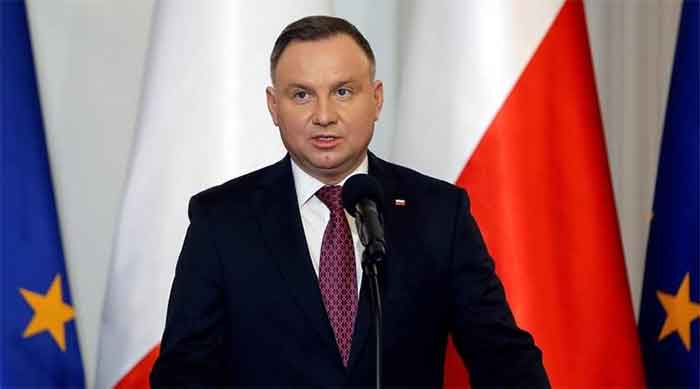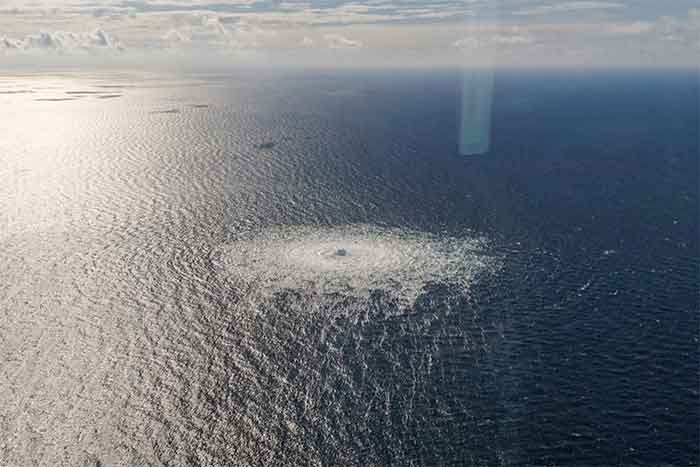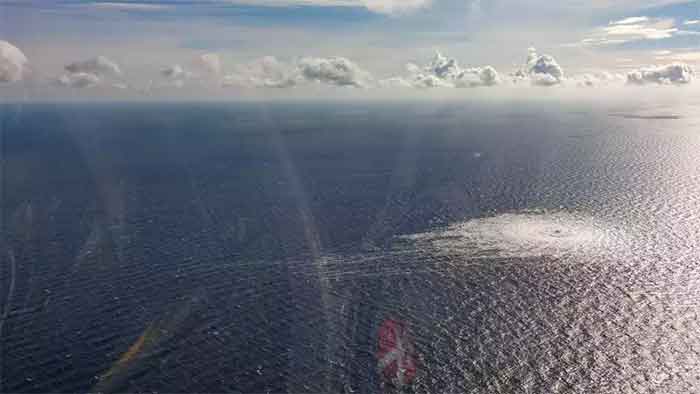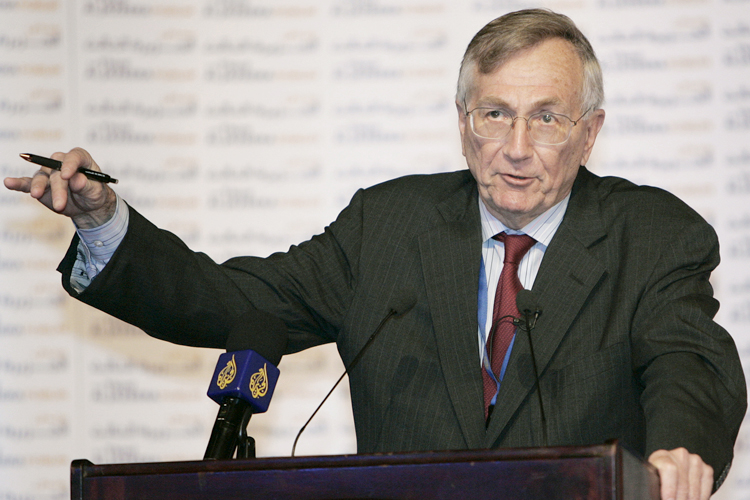
The gas pipeline Nord Stream blast has created diversified opinions and assessments.
The sabotage of the Nord Stream delivering Russian gas to Europe was a good thing, Polish President Andrzej Duda told CNN on Wednesday.
The destruction of the pipelines freed the continent from Russia’s “dominance” plans, the Polish leader claimed, adding that it ended the European nation’s dependence on Russian gas.
His words came in light of some recent media reports stating that some pro-Ukrainian forces might have been behind the attack on the pipeline, which took place in September 2022.
Duda said he could not confirm if it was a pro-Ukrainian act or not, but noted that if Nord Stream ceased “to exist,” it would be “beneficial” for Europe anyway.
Poland was one of the major opponents of the gas pipeline project and even lobbied for it to be dismantled in August 2022, roughly a month before the attack.
Duda also called the project part of Europe’s appeasement strategy in relations with Russia.
The Polish president, who spoke to CNN during his visit to the United Arab Emirates, also suggested handing all Polish MiG-29 fighter jets over to Kiev, but only as part of an international coalition supplying Ukraine with aircraft. “We are ready to deliver these planes, and I am sure that Ukraine would be ready to use them immediately,” he said, without specifying how many Soviet-made planes Warsaw still has in its arsenal.
Duda also called for Ukrainian pilots to be trained to operate the U.S.-made F-16 fighter jets, arguing that Kiev’s Armed Forces would like to be “up to NATO standards” anyway. “The training of Ukrainian pilots is important and it is quite necessary,” he said.
According to CNN, at least two Ukrainian pilots are currently in the U.S., where they have their skills tested in flight simulators to see how much time they would need to learn to fly various US-made military aircraft.
EU Energy Bills Soared 300%, Says Ursula von der Leyen
Media reports said:
EU member states saw their energy bills skyrocket by at least 300% last summer after a dramatic reduction of Russian gas supplies, European Commission President Ursula von der Leyen said on Wednesday.
According to the EC chief, the bloc managed to replace the shortfall in Russian natural gas by purchasing more from alternative suppliers, as well as by increasing energy efficiency by reducing consumption by 20%.
“Russia cut its gas supply to Europe by 80% in eight months, sending energy price in Europe soaring,” von der Leyen said addressing a joint session of the Canadian parliament. “Last summer, our energy bills rose by 300%.”
The top official alleged that Russian officials tried to blackmail Brussels by reducing the supplies as EU nations were heavily dependent on Russian gas.
She highlighted “an important role” Canada played to help tackle the energy crisis by boosting its production of liquefied natural gas (LNG).
The head of the EC has previously accused Moscow of blackmailing EU countries, after Russian state-owned energy giant Gazprom stopped gas supplies to Poland and Bulgaria in April 2022.
In response, the Kremlin assured everyone that the Russian party “was and remained a reliable supplier of energy resources to its consumers and was always committed to its contractual obligations.” Moscow insisted that both Bulgaria and Poland were cut off from Russian supplies only after they rejected the gas-for-rubles scheme.
This scheme was introduced by the Russian government in response to the sanctions imposed on Moscow over the military operation in Ukraine. Moscow demanded that the nations that had imposed the penalties pay for natural gas in rubles. The scheme requires importers to open accounts in Gazprombank. They can then deposit funds in their currency of choice, which the bank converts to rubles and transfers to the
West European Energy Subsidies Approaching $1 Trillion
An earlier media report said:
European nations have splashed out nearly €800 billion ($855 billion) on support measures as the region continues to reel from climbing energy costs, researchers at Brussels-based think tank Bruegel said.
The analysts have urged governments to be more targeted in their spending aimed at subsidizing bills for households and businesses, in the face of wild swings in prices for gas and electricity over the past year.
EU member states have so far allocated €681 billion to energy spending since September 2021, according to the researchers at Bruegel. Meanwhile, the UK and Norway have reportedly earmarked the equivalent of €103 billion and €8.1 billon, respectively.
The total of €792 billion marks a nearly €86 billion increase in spending since Bruegel’s last assessment released in November. The think tank attributes the boost to the region’s continued need to turn to more expensive supplies through winter after most EU states opted to stop importing gas from Russia.
Germany reportedly topped the spending chart, allocating some €270 billion, while the UK, Italy and France – the next highest – each spent almost €150 billion. Most EU states spent a fraction of that. Luxembourg, Denmark and Germany were the biggest spenders on a per capita basis.
The update on energy spending comes as EU member states are debating proposals to ease state aid rules further for green technology projects, as the region seeks to compete with subsidies in the U.S. and China.
The think tank cautioned that most of the support so far had been non-targeted and urged governments to change their approach. Analysts said that dynamic needed to change, as countries are running out of fiscal space to maintain such broad funding.
“Instead of price suppressing measures that are de facto fossil fuels subsidies, governments should now foster more income-support policies targeted towards the lowest two quintiles of the income distribution and towards strategic sectors of the economy,” according to Bruegel analyst Giovanni Sgaravatti.
Soaring Energy Prices Cost EU $1 Trillion, Reports Bloomberg
EU member states have spent roughly a trillion dollars (€940 billion) in the face of the bloc’s worst energy crisis in decades, Bloomberg said in an earlier report, citing calculations based on market data.
Soaring energy prices have sent its economies plunging into recession as most member states opted to stop importing gas from Russia, facing the necessity to turn to more expensive supplies.
The agency highlighted that the total estimated losses marks just the beginning of a full-scale crisis, as a period of high prices for energy could last years, while aid is already becoming unaffordable.
The security of energy supply is expected to remain an issue beyond next winter after the filled gas storage facilities across the region are emptied. The nations of the EU will have to refill their gas reserves for the next cold season with no deliveries from Russia, which also heats up competition for tankers.
Even with more import terminals for liquefied natural gas (LNG) coming online, the crisis will reportedly loosen its grip only in 2026, when additional production capacity from the U.S. or Qatar becomes available. At the same time, prices should remain high to attract LNG away from other buyers from energy-hungry Asian buyers.
A state of emergency could linger for years, according to Brussels-based think tank Bruegel, as quoted by Bloomberg.
“Once you add everything up – bailouts, subsidies – it is a ridiculously large amount of money,” Martin Devenish, a director at consultancy S-RM, told the agency. “It is going to be a lot harder for governments to manage this crisis next year.”
A rush to fill storage during summer, despite all-time high prices, has softened the supply squeeze so far. However, freezing weather is expected to give the region’s energy system the real test this winter.
Last month, Germany’s energy regulator, the Federal Network Agency, warned that German households and small businesses have failed their first gas-saving tests. The regulator noted that a reduction in consumption of at least 20% was required to avoid a gas shortage in the coming months.














































